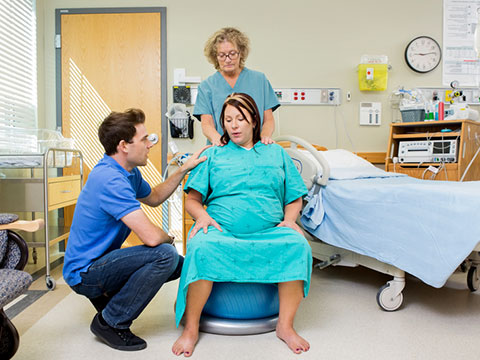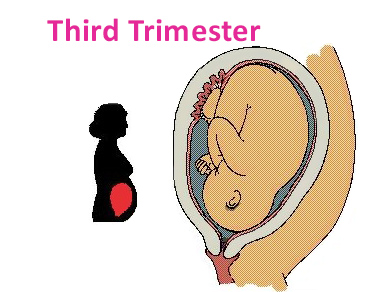The birth partner
 Recent research shows that effective labor support can actually shorten labors and prevent complications. And this isn’t a new discovery. Dr. Robert Bradley, a Denver obstetrician, found a generation ago that when fathers were brought out of the waiting room and into the delivery room, laboring women were more relaxed, experienced less pain and labored more quickly and easily. Hospitals now welcome birth partners into the delivery room because they make a positive difference in labor.
Recent research shows that effective labor support can actually shorten labors and prevent complications. And this isn’t a new discovery. Dr. Robert Bradley, a Denver obstetrician, found a generation ago that when fathers were brought out of the waiting room and into the delivery room, laboring women were more relaxed, experienced less pain and labored more quickly and easily. Hospitals now welcome birth partners into the delivery room because they make a positive difference in labor.
As an expectant father, you can do more than just sit there and time contractions while your partner does all the work. Here are some time-tested suggestions how you as a birth partner can help her.
See if she is relaxed. The best way to make labor hurt really badly is to tense up during contractions. Help her completely relax – not just lie still, but deeply let go of all tension in her muscles. Have her focus on relaxing her feet, while you massage them. Work your way up her body – legs, hips, back, shoulders, neck, face, arms, hands. If you have practiced this during pregnancy, it will work better for you in labor.
Take a walk with her. Walking shortens labor by about 30 percent. Don’t let her get stuck in bed too soon; help her stay up and moving as long as possible.
Help her into a different position. The baby is rotating as he moves down the birth canal. Mommy should move around, too. She may not want to move once the contractions are really strong, so you should suggest the new position and help her into it between contractions. Some helpful positions are kneeling or leaning against a wall, sitting upright, standing, all fours (wonderful for backache). Save lying in the bed for when she’s tired.
Rub her down. Massage her shoulders, arms and legs.
Press in. If she has a lot of backache, you are in for a workout. Pressing your fist firmly below the small of her back may make much of the pain go away. You may have to experiment until you get the right spot. You will have to press very hard and start when the contraction starts. Mark the magic spot with a marker so you can find it in a hurry.
Stroke her. Stroking is a gentler touch than massage, though not so light that it is annoying. Stroke the whole length of her arm, leg and back; stroke her face and head as well. Brushing her hair or scratching her back is another kind of light stimulation that can reduce pain sensation.
Run a warm bath for her. Water has been called “Mother Nature’s epidural”. It helps the laboring woman relax and eases the pain of contractions. Baths should be warm, not hot. If her bag of waters is broken, have her take a shower instead. Many hospital showers have seats in them. Bring your swimming suit, in case she wants you in there with her!
Try warm and cold compresses. Soak a washcloth in warm water and press it on her sore back during a contraction. Keep a cool washcloth on her sweaty brow during hard labor and pushing.
Make sure she’s drinking enough. Dehydration will only make her body work less effectively. If the hospital will not allow her to drink water, she may be able to suck on ice chips. Some hospitals allow laboring women to suck on frozen pops (get the 100 percent juice ones) or have a spoonful of honey for an energy booster.
Make sure she eats if she’s hungry. Food will be the last thing on her mind in hard labor, but before that, keep her going on high-energy choices like breads and cereals. Have her eat something right before you leave for the hospital, since she will not be allowed to eat there until after the baby is born.
Deal with phone calls. If your mother-in-law calls to find out how things are going, you should be the one to handle the call.
Drive carefully. Obey all posted speed limits on your way to the hospital or birth center. You have lots of time. Probably.
Maintain a positive climate. Hospitals are not like home. They are geared for emergency and abnormal situations and those reminders are everywhere. Some laboring moms tense up just by being in a hospital. You can help her regain her confidence by reaffirming that her body knows how to labor and give birth.
Do soothing, repetitive actions. The same words and the same actions, repeated with each contraction, can be very reassuring.
Make sure her environment is peaceful. Are the lights too bright? Is the music too loud? Is the nurse on the new shift too bossy, or is her forthrightness just what your partner needs?
Turn on some music or TV. One friend of mine had Johnny Carson going while she was giving birth. The distraction helped her. The only drawback was that the OB started watching Johnny’s routine between contractions.
Turn off the music or TV. My first baby arrived right around the time of the NBA championship, and, as luck would have it, my home town team was playing my husband’s home town team in the final series. We had a little discussion about what we wouldn’t be watching during labor.
Run interference. Sometimes hospital routines can interfere with labor. For instance, maybe it’s time for a vaginal exam, but your partner is due for another contraction. Your first priority is your partner. Ask if it would be all right to delay the exam until after the next contraction.
Employ her imagination. Have her imagine that she is floating weightlessly on a cloud or picturing the contraction as a wave, and she is swimming up and over the top of it. Or describe to her a pleasant memory or place. You might want to talk about ideas for this before labor, so you know that the seascape you’re describing isn’t making her seasick.
Ask a nurse for ideas. Labor and delivery nurses have a lot of experience and may have an idea that is just what you need.
Remind her about the baby. She may have forgotten why she’s going through all this!
Listen to her. Is something distracting her or what is she afraid of?
Don’t stop what you’re doing when the nurse walks in. Your partner doesn’t care if the entire American Medical Association has dropped by to watch her labor. She just needs you to keep helping her.
Find out what’s working. Sometimes nurses encourage their patients to use a certain breathing pattern or pushing method. Ask your partner quietly if it is helping. If it is not, kindly ask the nurse if there is a different way of coaching her in this particular time of labor.
Wait for signs of transition. It comes right before the active second stage – the phase of pushing, when woman’s hormones are preparing for birth. The symptoms are: hot flashes, burping, nausea, one contraction on top of another.
Tell her what a great job she is doing. Labor is such a difficult task. Praising her over and over may sound corny to you, but it may be just what she needs.
Enjoy it! Labor is very hard work, but the sight of your baby’s birth is one you will never forget. Savor the magic of a moment that is, quite literally, once in a lifetime.







Having a Doula during the birth of my little one was so fantastic! I would highly recommend any one planning to have natural child birth to look into partnering with a Doula.